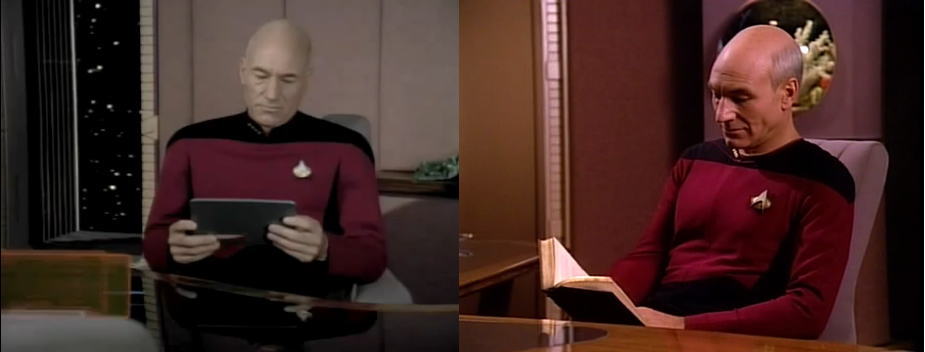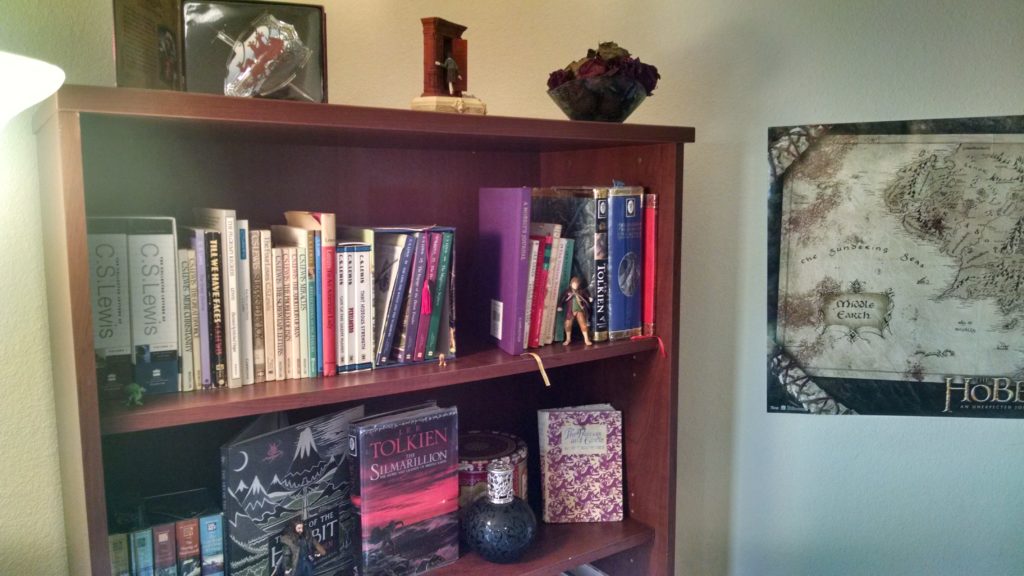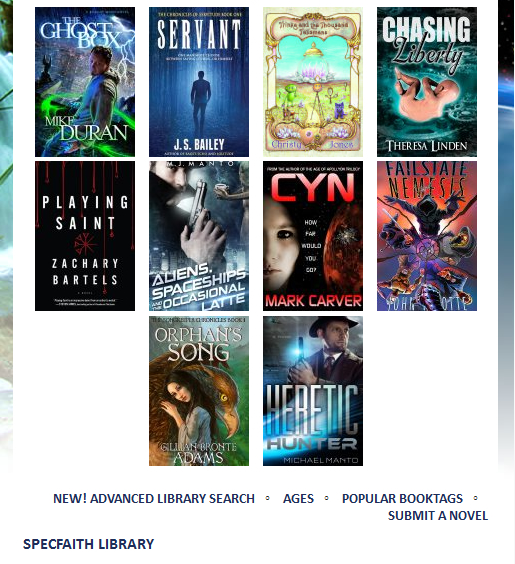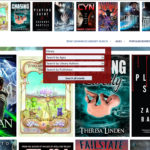Do Bookshelves Matter?
“Failstate Has Been Spotted in a Bookstore!” proclaimed yesterday’s headline at the website of novelist (and former SpecFaith regular) John Otte.
Sure enough, there it is: Failstate: Nemesis, the final volume of the Failstate series.
And here I thought society wanted to move the concept of finding books in bookstores and buying them in bookstores and instead moving all our book things to the internet.
Apparently physical bookshelves and book copies still matter to us, in some way.
Occasionally I laugh at post-dystopian and science-fiction films and television shows that purport to show a future consisting only of gleaming swooshy chrome and glass buildings and furniture. Presumably in the future all physical books are extinct, not because of bad governments but because we just don’t need them for reading anymore; we need only use holograms or screens. This just doesn’t make sense, because humans have two impulses that will almost always push back against such potentially drastic societal overhauls.
1. Bookshelves matter as a human institution.
 The first impulse is that we’ve had bookshelves for centuries and there’s no real reason to stop now. Even if people could develop and live in anti-gravity, our houses would have chairs and tables. And I think we will always have bookshelves, even if they’re very small.
The first impulse is that we’ve had bookshelves for centuries and there’s no real reason to stop now. Even if people could develop and live in anti-gravity, our houses would have chairs and tables. And I think we will always have bookshelves, even if they’re very small.
By the way, better science fiction recognizes this. Captain Jean-Luc Picard in Star Trek appreciates older relics and model starships, and is often seen reading physical books. And it’s not just for budgetary reasons that even recent films such as Ender’s Game show futuristic appliances and vehicles operating inside and outside standard-suburb homes.
2. Bookshelves matter as a status symbol.
The second impulse is best explained this way: Legal firms’ cable TV commercials (if those are still around) feature(d) the suited attorney standing in front of a row of impressive bookshelves. This may be comical because they’re likely searching statutes more often in a digital version. But they will keep the bookshelves anyway because they look impressive.
We do the same—or at least I do. I like my impressive bookshelves. In my study, called the “story room,” I have three shelves: one for nonfiction and two for fiction, including classics. One more shelf featuring favorite fantastical books—Lewis, Tolkien, etc.—is even more accessible in the dining area. And that one includes not only books but fantasy-esque décor such as that The Lion, the Witch and the Wardrobe bookend or a Bilbo Baggins action figure.
But are bookshelves efficient?
You’ll notice what I left out above: anything about bookshelves being a better technology, easier to access, a better motivator for reading, or a more profitable way to promote books.
Arguably, bookshelves and physical books are not the best way to do any of those.
I’ve only myself discovered this recently. Although I’ve often made us of the Kindle desktop software, last year I bought my first smartphone and installed Kindle on it. Suddenly my reading took off. E-books are a better technology. They’re easier to access—on vacations, during lunch breaks, in the car, in the bedroom, and in—let’s just come out and say it—in the bathroom. You can find free ebooks easier than real books (and I still have a backlog of complimentary novels and nonfiction books). And it’s far easier to find and buy ebooks.
No, but that’s not the point
We still want bookshelves. Surely we’ll always want them, even if it doesn’t make sense. We want them because they seem more human, feel like status symbols, and provide a kind of specialness that ebooks, despite their many advantages, can’t provide.
This is also true for book creators.
- “I wrote and published a downloadable ebook.” Well, okay, cool.
- “I wrote and published a book that’s actually on store bookshelves.” Huzzah!
Much nonphysical ink has been spilled—some by myself—about an apparent decrease in our zeal about digital publishing populism and amazing ebook revolutions and things. That is simply inevitable in the human story. Someone invents a car, but horse-drawn carriages continue at least as tourist attractions. Someone invents an electric shaver, but people give that a try and then go back to the disposable plastic razors. And someone invents e-reading without bookshelves, and people give that a try but then gradually find they are integrating this new approach into their reading instead of wholly replacing their real bookshelves.
My prediction is that people will continue to use both approaches to find novels. Sometimes we’ll browse actual bookstores. Sometimes we’ll browse the web, as Rebecca LuElla Miller explored in her Monday feature. And as you’re searching for stories on the web, stop by the SpecFaith Library. Not only does it feature every published Christian fantastical novel we can find, but it’s newly revamped to look more like, well, like a bookshelf.










































#2 – as a status symbol – this I think is very true although I bet they only impress certain types of people. Regardless, my bookshelves are what I am proudest of in my home and I also love that I never have enough space on them.
That whole big library or huge bookshelf is great if you’re in a stable career, with a stable income, and foresee living in about the same general location most of your life.
If you’re like me, who has NONE of those guarantees, then a virtual library is an absolute Godsend. The heaviest thing I had to move the first time I hopped apartments was all my books, and I decided I just couldn’t keep them all (especially the ones I hadn’t reread in years). Now I have a modest, limited bookshelf that keeps my absolute essentials (such as books authors have signed or that have extreme sentimental value) while keeping the majority of my reads in digital form, both on my computer and in a zipped backup. Makes moves across town (or across state, or even the country) much, much simpler.
Also, when I want to quickly look up a character, author, quote, etc, I just pulled up my digital library and perform a search, rather than scattering the room with tomes I might never be able to discover the pertinent information from. That’s very helpful when I write reviews on my blog.
After our 2nd move, my husband bought me a nook and begged me to stop buying physical books. So now I only buy my absolute favorites. But I still get a lot of hard copies by giveaways and such. But we recently bought a house so I told him at least we don’t have to worry about moving for a while! 😉
Also,people who think we’re going to go all digital overlook some very real things that print books just do better. No matter how high-tech screens are, print books are easier on the eyes, don’t require batteries, and can flip easier. I request ebooks from the library, but there are still a lot of books that work better in print. Anything with graphics or significant imagery, for example. I find it much easier to read comics/graphic novels in print, especially if the author is trying something unusual with layouts.
I love my physical books, and I still think the BEST book experience is with a “real” book. But….I have to say I do enjoy my Kindle. Didn’t think I would. But I love being able to look up words I don’t know, or to highlight, make notes, etc. I just have a basic Kindle, so I”m sure if I got a newer one I would love the opportunity to immerse myself even further in the story with all the extras now supplied with some of the newer e-books. And reading a long book is much easier on the hands in e-book version!
However, there is something to be said for just letting your imagination do the work of “seeing” a place described in the book, rather than clicking on a link to see a picture or an artist’s rendering of it.
So, basically, I love books in whatever form they are in, and am so glad to be able to experience both the regular book and the e-book.
I would love to have a wall of books, filled with beautiful first editions or limited editions of my faves. But that’s in my dream world….
I still haven’t jumped on the ebook bandwagon when it comes to reading. For me, it’s easier to look at a physical book when reading. I spend many hours a day on the computer writing and using social media, and when I want to read I like the break from looking at a screen.
I have several large bookshelves prominently on display in my living room. The books are grouped together by author and genre, so I have my Koontz and King books crammed into one shelf (for example) and my Dekker collection squished into another. I’ve been going to the library more often lately, because while my bookshelves are large, they are also full!
I find it much easier to read e-books nowadays, because I have them on my phone, which is with me all the time, lights up (so I can read when it’s dark too), can be held in one hand, and is available any time I have a moment to read more.
But when I really love a book, I go buy a hard copy too if I can, because I want it on my shelf to display to other potential readers, and I want to be able to lend it. 🙂 Sadly, I don’t have space for a regular bookshelf in my living room right now (and I have little kids/babies who will pull the books off), so all my books are in the basement right now, rarely seen by anyone. But I always arrange them on the shelf to showcase my favorites. It’s like having bumper stickers its says something personal about me, and shares some of my values, so to speak. 🙂
One of the many reasons I love my physical bookshelf is the aesthetic beauty of it. All those brightly colored covers and favorite titles fill me with joy. It’s like each book is an adventure waiting to happen, and all I have to do is step up and pick one.
Mostly ebooks for me. Only physical media I have tend to be ones I think won’t be offered digitally or that I want to keep 5+ years. I don’t have people over often, so the status of bookshelves isn’t a factor. I buy some physical books, but mostly textbooks, and my once-a-week trip for manga to books-a-million.